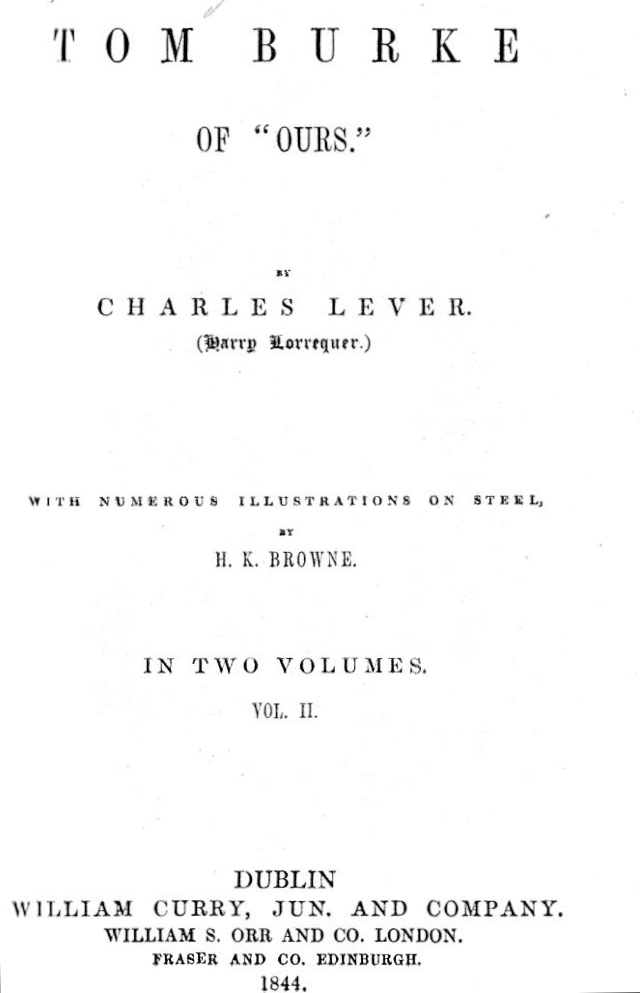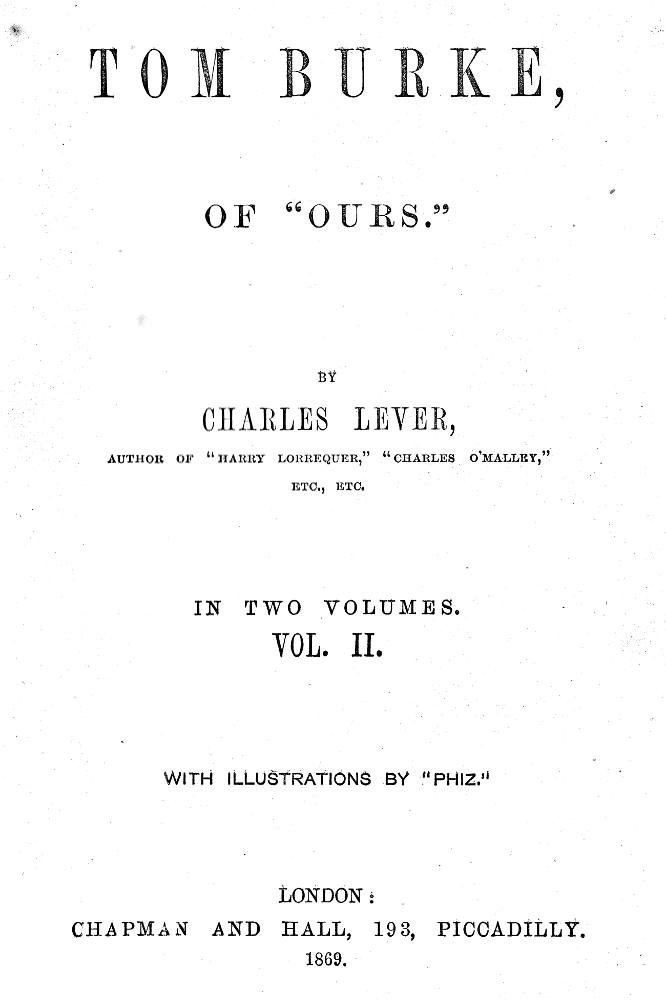

A Parting Scene with Napoleon (facing title-page in both editions) vertically-mounted, 13.6 cm high by 9.7 cm wide, (5 ⅜ by 3 ¾ inches), vignetted steel illustration for Charles Lever's Tom Burke of "Ours," Chapter LXXXV, "Fontainebleau" (September 1844). Title-page from the William Curry, Jun. two-volume edition (Dublin, 1844). Frontispiece in the 1869 Chapman and Hall reprint. [Click on the image to enlarge it; mouse over links.]
Passage Illustrated from the Final Instalment for 1844

“What means this? — who are you, sir?” was the quick, sharp question he addressed to me.
A few words — the fewest in which I could convey it — told my story, and expressed my sorrow, that in the sick man's fancy of a moonlight walk I should have disturbed his Majesty.
“I thought, Sire,” added I, “that your Majesty was many a league distant with the army —”
“There is no army, sir,” interrupted he, with a rapid gesture of his hand; “to-morrow there will be no Emperor. Go, sir; go, while it is yet the time. Offer your sword and your services where so many others, more exalted than yourself, have done. This is the day of desertion — see that you take advantage of it.”
“Had my name and rank been less humble, they would have assured your Majesty how little I merited this reproach.”
“I am sorry to have offended you,” replied he, in a voice of inexpressible softness. “You led the assault at Montereau? I remember you now. I should have given you your brigade, had I —” He stopped here suddenly, while an expression of suffering passed across his pale features; he rallied from it, however, in an instant, and resumed, “I should have known you earlier; it is too late! Adieu!”
He inclined his head slightly as he spoke, and extended his hand. I pressed it fervently to my lips, and would have spoken, but I could not. The moment after he was gone. [Chapter LXXXV, "Fontainebleau," 284 in vol. 2 of the 1844 edition; 337 in Chapter XLI of the 1869 edition]
Commentary: An Ironic Parting at the Fontainebleau Palace on 10 April 1814
The sacramental nature of the parting scene Phiz conveys through the shadow in the archway, the awful stillness of Napoleon's sentry, and Tom's kneeling as a supplicant. Only at their moment of parting has Napoleon genuinely recognised Tom and seen seen him for the devoted servant he has ever been. The illustrator is less sympathetic than the novelist to the dethroned Emperor about to go into exile. At the opening of the chapter, Lever signals Napoleon's fall: "Each day we learned some intelligence either from the seat of war or from Paris: defeat in one, treason and disaffection in the other, were rapidly hastening the downfall of the mightiest Empire the genius of man had ever constructed. Champ-Aubert, Montmirail, and Montereau, great victories as they were, retarded not the current of events. 'The week of glory' brought not hope to a cause predestined to ruin" (334). Lever does not anticipate the so-called "Hundred Days" at the culmination of which Britain terminated Napoleon's return to power with its decisive triumph over his forces at Waterloo on 18 June 1815. Exiled a second time, the ci-devant Emperor of the French died on the remote island of St. Helena off the African Coast on 5 May 1821, aged fifty-two.
In the illustration, Napoleon's person bodyguard, Rustan, a Mameluke, in stained and travel-worn trappings, has awakened from his post at the garden entrance to Napoleon's chamber at the palace of Fontainebleau as Tom approaches. The scuffle between the devoted bodyguard and Tom, whose stumbling has awakened him, is interrupted by the Emperor himself as he enters the courtyard through the door to his vestibule. Immediately Napoleon remembers Tom as leading the assault on the bridge at Montereau. Tom kisses his hand, and Napoleon reenters his room.
Further Information
- Charles Lever's Fourth Novel, Tom Burke of "Ours" (February 1843 — September 1844)
- Phiz and Lever: A Fascination with Napoleon (1840-43; seven plates)
- Instalment-by-instalment Synopsis of the Novel's Plot and Characters: Lever's Tom Burke of "Ours" (February 1843)
- Instalment-by-instalment Synopsis of the Novel's Plot and Characters: Lever's Tom Burke of "Ours" (March 1843)
- Synopsis of the Novel's Plot and Characters for Tom Burke's Adventures in France in Lever's Tom Burke of "Ours" (April 1843 through June 1844)
- Synopsis of the Novel's Plot and Characters for Tom Burke's Final Adventures in Ireland and France in Lever's Tom Burke of "Ours" (July through September 1844)
Scanned image and text by Philip V. Allingham. [You may use this image without prior permission for any scholarly or educational purpose as long as you (1) credit the person who scanned the image and (2) link your document to this URL in a web document or cite the Victorian Web in a print one.]
Bibliography
Buchanan-Brown, John. Phiz! Illustrator of Dickens' World. New York: Charles Scribner's Sons, 1978.
Lester, Valerie Browne Lester. Chapter 11: "'Give Me Back the Freshness of the Morning!'" Phiz! The Man Who Drew Dickens. London: Chatto and Windus, 2004. Pp. 108-127.
Lever, Charles. Tom Burke of "Ours." Dublin: William Curry, Jun., 1844. Illustrated by H. K. Browne. London: Chapman and Hall, 1865; rpt. 1869. Serialised February 1843 through September 1844. 2 vols.
Lever, Charles. Tom Burke of "Ours." Illustrated by Phiz [Hablột Knight Browne]. Vol. I and II. In two volumes. Project Gutenberg. Last Updated: 24 February 2021.
Steig, Michael. Chapter Four: "Dombey and Son: Iconography of Social and Sexual Satire." Dickens and Phiz. Bloomington: Indiana U. P., 1978. Pp. 86-112.
Stevenson, Lionel. Dr. Quicksilver: The Life of Charles Lever. London: Chapman and Hall, 1939.
_______. "The Domestic Scene." The English Novel: A Panorama. Cambridge, Mass.: Houghton Mifflin and Riverside, 1960.
Created 15 September 20232 Last updated 11 November 2023